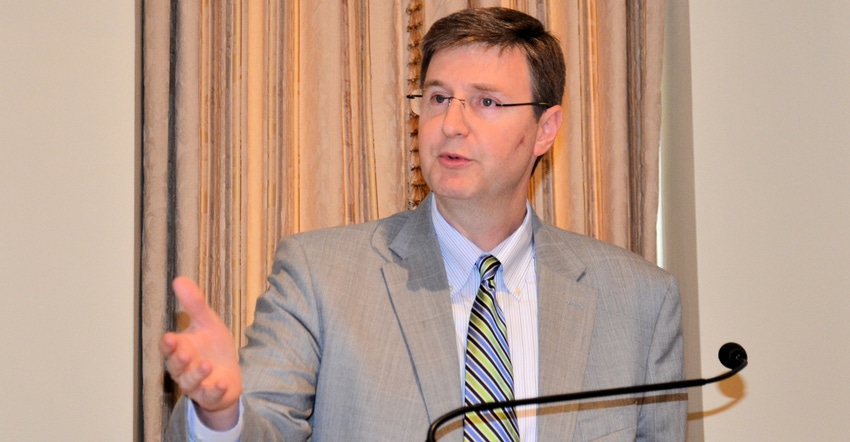
The Trump administration is fully aware that the agriculture industry needs trade agreements and that there is major pain in the farm economy, according to Ray Starling, the president's adviser on agriculture, trade and food assistance.
Addressing the North American Agricultural Journalists, Starling touted the accomplishments of President Donald Trump's first 100 days in office and outlined four main priorities for agricultural policy.
He put trade first on the list and said that as it stands now, China has top billing for trade negotiations because of the rapport that Trump was able to build with President Xi Jinping during his recent visit to Mar-a-Lago.
"Three weeks ago, I would have said the order of business would be NAFTA [North American Free Trade Agreement], Japan, then China. But after that visit, China is going well. We will be moving on Japan, too; we just need to get people in place. We need to get the U.S. Trade Representative in office."
The nomination of Robert Lighthizer for the USTR position advanced out of Senate committee on April 24, and confirmation was expected to follow quickly.
The second major priority for Trump's agriculture policy will involve providing ag with the access to labor that is holding back some farms and ag enterprises, especially in dairy, from expansion. Starling said that the administration will be looking carefully at the H2-A visa program and determining how to improve or expand it.
The third priority will be the elimination of some regulations and the streamlining of others. He said there are too many regulations on the books that are not getting the outcomes they were intended to provide, and they need to be scrapped.
Finally, he said, there will be a new emphasis on rural infrastructure, including land-grant college research and access to broadband. He said the administration will be working with state departments of agriculture and leaders in the farm credit and banking sector to determine how best to make improvements.
"Often, when you talk about infrastructure, people think of a big spending package. Well, that doesn't have to be the case,” he said. "We want to leverage the dollars that are already in the system and find ways to make it more efficient. And we want to leverage the private dollars as well. There are private projects out there that have been held back to see what the public sector is going to do. We can figure out how to partner on those."
Starling touted the success of Trump's first 100 days in office, saying the executive order to halt the EPA’s unpopular proposed rule on waters of the U.S. was a major accomplishment. Implementation of the rule had already been halted by a court action, and no part of it ever went into effect.
He said a proclamation making March 21 Ag Day was also a major accomplishment that hadn't been done by the president in the past 16 years. In the past two administrations, the Ag Day proclamation was issued by USDA.
In restoring it as a presidential proclamation Trump said, "I love my farmers" and "Farming is a tough job; it can be really hard." It was impressive, Starling said, that Trump signed the proclamation with a signature that "must have been at least 3 inches high," showing his enthusiasm for praising the farming industry.
Starling said that an EPA ruling to deny a petition to ban the pesticide chlorpyirfos also was huge for the 40,000 farmers who use the pesticide. The petition would have taken chlorpyirfos off the market in spite of the fact that new research requested by the administration countered prior evidence of its toxicity.
Trump also convened a roundtable of 15 farmers for a listening session on April 25, the same day that former Georgia governor and agribusinessman Sonny Perdue was sworn in as secretary of agriculture.
Following the roundtable, he signed an executive order creating a special task force on agricultural issues and named Perdue chairman of that task force. It will replace the Obama-era Council on Rural Affairs.
About the Author(s)
You May Also Like




